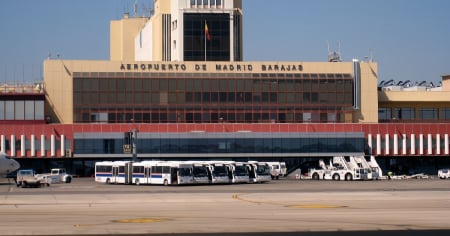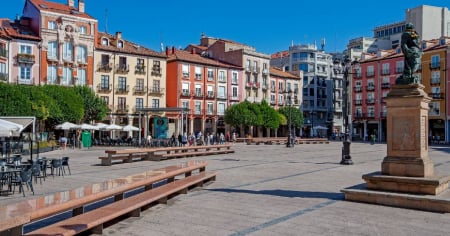A joint operation between the National Police of Spain and EUROPOL dismantled a sophisticated money laundering network led by the Russian mafia, which is connected to Cuba.
This criminal network, which handled several million euros monthly, had connections with criminal organizations from various countries and had established contacts with Cuban authorities with the intention of investing in the island, according to a statement from the Ministry of the Interior.
The operation culminated in the arrest of 14 individuals and the seizure of over one million euros in cash, as well as encrypted devices and documents pertinent to the investigation.
Money laundering destined for Cuba
One of the most striking aspects was the organization's intention to establish investments in Cuba through the installation of photovoltaic plants for energy supply.
According to data obtained by the researchers, those responsible for the scheme had engaged in negotiations with officials of the Cuban government to develop this project.
In exchange for the investment in energy infrastructure, the Cuban regime would provide large quantities of strategic minerals.
"Another business in which the individuals under investigation intended to enter was the installation of photovoltaic cells in Cuba with the aim of providing energy to the island, for which they reached out to members of the Cuban administration to initiate this business, in exchange for which the Cuban government would provide large quantities of minerals, specifically nickel and gold," the Spanish Ministry of Interior's statement reads verbatim.
This strategy represented a double benefit for the criminal network: it not only allowed them to enter the Cuban market and launder part of their capital, but it also assured them a source of valuable resources in an economy with few alternatives for external financing.
The Spanish newspaper El País specified that for the "still nascent" business in Cuba, they had even hired a Spanish lawyer who boasted in his conversations about handling the affairs of a well-known Spanish politician, according to sources close to the investigation.
The lawyer is not among those arrested, these sources detail.
The operation was in the second, in Cuba, where contacts had begun with the island's authorities to set up a photovoltaic power generation plant for which he would be paid in nickel and gold.
An international criminal network
The investigation, which began in 2023, revealed that this money-laundering network not only operated in Spain but also had connections in multiple countries, including the Netherlands, Estonia, Lithuania, and Italy.
It was a highly sophisticated structure that offered illicit financial services to various criminal organizations, including the Armenian mafia, Albanian and Serbian cartels, groups of Chinese and Ukrainian origin, the feared Mocro Maffia from the Netherlands, and Colombian drug traffickers.
The organization had implemented a decentralized system of "cashiers" that managed the flow of money in various Spanish cities.
These individuals were responsible for receiving and distributing large sums of cash, with daily transactions that in some cases reached up to 300,000 euros.
In exchange for its services, the organization charged a commission that ranged from 2% to 3% of the laundered money.
Modus operandi: A multinational of crime
The network operated with a level of professionalism never before seen in Europe, according to the aforementioned Spanish newspaper.
Each office was equipped with exceptional security measures: secure safes, high-capacity bill counters, and soundproof cabinets to prevent the detection of the sound from the money counting machines.
The "cashiers" received manuals with strict protocols and fines in case they violated any of the operational regulations set by the organization's leaders.
Additionally, the members of the network took extreme precautions to avoid being detected.
They frequently changed residences and vehicles, used encrypted phones that would simultaneously lock if any of their members were arrested, and periodically rotated cities.
They also maintained security floors exclusively designated for money laundering operations.
During the investigation, agents discovered that the Russian organization had clashed with a faction of the Armenian mafia, which attempted to steal over half a million euros from one of its "cashiers."
The attempted robbery failed due to the security measures implemented by the Russian network, which led to a conflict between both organizations.
As a result, a meeting was organized in Spain with the participation of high-ranking officials from the Russian and Armenian organized crime groups to prevent an escalation of violence between the two groups.
Dismantling of the network and arrests
After two years of investigation, the National Police, with the collaboration of EUROPOL, carried out the final phase of the operation, called "Strongbox."
During the raids conducted in Madrid, Málaga, Marbella, Torremolinos, Coín, Ayamonte, and Lisbon, more than one million euros in cash were seized, along with four cash-counting machines, encrypted devices, and key documentation.
A cryptocurrency wallet and several properties of the organization in Spain were also blocked.
Among the 14 arrested, there were the three main "cashiers" of the network, two of them Russian nationals and one Armenian, along with a Spanish police officer who provided documentation to regularize the members of the organization in the country.
The leaders of the plot have been ordered into provisional custody by the Court of Instruction number 46 in Madrid, and authorities do not rule out future arrests.
This operation is part of the European Union's strategy to combat organized crime and has been co-funded by the Internal Security Fund (ISF) of the European Commission.
The question remains open regarding the depth of the connections between the Russian mafia and authorities in Cuba.
The investigation is ongoing, and authorities are seeking to uncover the extent to which the island may have become a new haven for money laundering and the investment of illicit funds stemming from organized crime.
As of the closure of this report, the Cuban regime has not commented on the case.
Frequently asked questions about the dismantling of the Russian mafia's money laundering network and its connection to Cuba
What criminal network was dismantled in Spain and what is its connection to Cuba?
The operation dismantled a money laundering network led by the Russian mafia, which intended to invest in Cuba by constructing photovoltaic plants. The investigation revealed that this organization had established contacts with Cuban authorities to facilitate these investments in exchange for strategic minerals such as nickel and gold.
How did the money laundering network dismantled in Spain operate?
The network operated in a highly sophisticated manner, offering illegal financial services to various criminal organizations. They used a system of "cashiers" distributed across different cities to manage the flow of money, with daily transactions that could reach up to 300,000 euros. In exchange for these services, they charged a commission of 2% to 3% on the laundered money.
What security measures did the criminal network use to avoid detection?
The organization implemented exceptional security measures, such as safes, high-capacity bill counters, and soundproof cabinets. The "cashiers" followed strict protocols and frequently rotated between cities. They used encrypted phones that would lock if one of the members was arrested, and maintained secure floors exclusively for money laundering operations.
What were the results of the police operation against the money laundering network?
The operation concluded with the arrest of 14 individuals and the seizure of over one million euros in cash. In addition, cryptocurrency wallets were blocked, and properties linked to the organization in Spain were confiscated. Among those arrested were the main "cashiers" of the network and a Spanish police officer who provided documentation to the members of the organization.
What is the current situation of the investigations regarding the link between the network and the Cuban government?
Investigations are ongoing to determine the depth of the connections between the Russian mafia and Cuban authorities. So far, the Cuban regime has not commented on the case, leaving open the question of whether Cuba has become a new haven for money laundering and the investment of illicit funds from organized crime.
Filed under:






